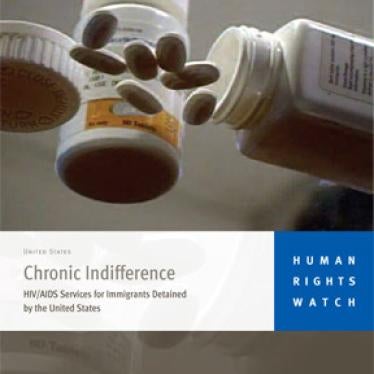Inferior medical care for HIV-positive immigrant detainees threatens their health, and ultimately their lives, Human Rights Watch said today at the 2008 International AIDS Conference in Mexico City. The US Department of Homeland Security (DHS) – the agency charged with providing health care services to detainees – fails to ensure timely HIV prevention and treatment services, putting many at risk of infection, resistance to treatment, and even death.
“Inconsistent and inadequate medical care for HIV-positive immigration detainees endangers their health and lives,” said Megan McLemore of Human Rights Watch’s Health and Human Rights Program. “Unless Homeland Security reforms its treatment systems, more immigrants will die or fall sick for no good reason.”
In a December 2007 report, “Chronic Indifference: HIV/AIDS Services for Immigrants Detained in the United States,” Human Rights Watch documented the difficulties encountered by detainees with HIV and AIDS in obtaining essential medical services.
The investigation included interviews with current and former detainees, DHS and detention facility officials, and an independent medical review of treatment provided. The report found that the Department of Homeland Security fails to collect vital information concerning the number of detainees with HIV and fails to adequately monitor their medical care. The medical detention standards fail to comply with international or national guidelines for appropriate HIV services and treatment.
In a July 2007 case, Victoria Arellano, a 23-year-old transgender immigrant from Mexico, died of AIDS-related meningitis in the San Pedro federal detention center in California. Arellano was denied necessary treatment and became gravely ill. Detainees in her housing unit repeatedly alerted the guards to the fact that she needed medical care, but she was left suffering in her bunk as her condition worsened. Finally taken to the facility clinic, she was taunted and ridiculed by staff. An internal staff review later determined that the medication given to Arellano was “completely useless” and that a policy delaying laboratory testing of detainees was “particularly dangerous with many chronic care cases and [es]pecially for HIV/AIDS patients.”
Human Rights Watch, together with a national coalition of immigrant advocates, has repeatedly urged the Department of Homeland Security to improve its detention standards to meet national and international guidelines, to formalize the voluntary standards so that they can be enforced, and to improve the monitoring of medical care in all of its hundreds of facilities. The United States Congress has held hearings on the more than 80 deaths in immigration detention since 2002, and legislation is pending that would establish a minimum threshold for immigrant medical care. DHS has undertaken a lengthy internal review of detention standards but the department has resisted formalizing any standards and maintains that its current inspection programs are adequate.
“The Department of Homeland Security says it spends millions to fulfill its legal duty to provide care to immigrants in detention,” said McLemore. “But until real steps are taken to ensure that detainees with HIV receive adequate care, the most vulnerable will face unnecessary illness, and even untimely death. And until it sets standards that can be enforced, Homeland Security can’t guarantee proper care.”
Selected cases documented in the Human Rights Watch report, “Chronic Indifference: HIV/AIDS Services for Immigrants Detained in the United States”:
- Charles B., a lawful permanent resident from Jamaica, became resistant to 13 leading AIDS drugs during more than four years in immigration custody. This left Charles with almost no options for treatment, even in the United States, as well as a disabling neuropathy that prevents him from working.
- Anna F., a 61-year-old woman born in Germany, failed to receive medically indicated treatment to prevent pneumonia.
- Gloria M., an AIDS counselor in Chicago, was told by jail officials that “the state won’t pay” for her HIV medications, interrupting her treatment until she could receive medications from her family.







